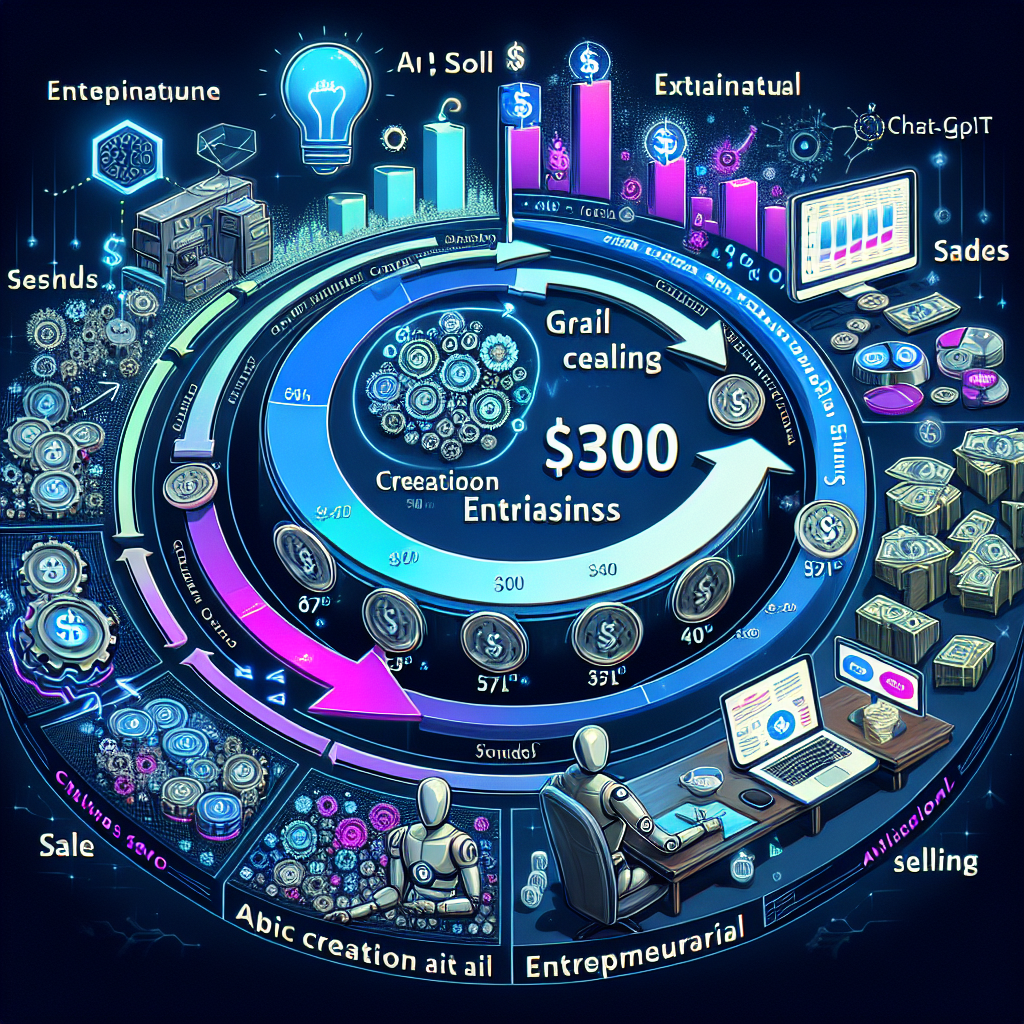-
Table of Contents
“AI Creativity Meets Profit: Turning Words into Wealth in Just Two Days!”
Introduction
“ChatGPT Wrote It, I Sold It — And It Made $300 in 48 Hours” is an intriguing exploration of the intersection between artificial intelligence and entrepreneurship. This narrative delves into the innovative use of OpenAI’s ChatGPT, a powerful language model, to create and sell content that generated a notable profit in a remarkably short time. The story highlights the potential of AI-driven creativity in the digital marketplace, showcasing how leveraging advanced technology can lead to unexpected and lucrative opportunities. Through this experience, the author uncovers insights into the evolving landscape of content creation and the role of AI in shaping new business models.
Leveraging AI for Quick Profits: How ChatGPT-Generated Content Can Boost Your Sales
In the rapidly evolving digital landscape, the integration of artificial intelligence into various sectors has become increasingly prevalent. One such application is the use of AI-generated content to drive sales and generate quick profits. A compelling example of this is the experience of an entrepreneur who utilized ChatGPT, an advanced language model developed by OpenAI, to create content that remarkably generated $300 in just 48 hours. This case highlights the potential of AI in content creation and its ability to significantly impact sales strategies.
The process began with the entrepreneur identifying a niche market that required engaging and informative content. By leveraging ChatGPT, they were able to produce high-quality articles, blog posts, and marketing materials tailored to the specific needs of their target audience. The AI’s ability to understand context and generate coherent, human-like text allowed for the creation of content that resonated with readers, thereby increasing engagement and driving sales.
One of the key advantages of using ChatGPT for content creation is its efficiency. Traditional content creation can be time-consuming and costly, often requiring the hiring of skilled writers and editors. In contrast, ChatGPT can generate content quickly and at a fraction of the cost, enabling entrepreneurs to allocate resources more effectively. This efficiency not only accelerates the content production process but also allows for rapid testing and iteration, which is crucial in today’s fast-paced market environment.
Moreover, the versatility of ChatGPT is another factor that contributes to its effectiveness in boosting sales. The AI can be used to generate a wide range of content types, from product descriptions and social media posts to in-depth articles and customer support responses. This flexibility allows businesses to maintain a consistent brand voice across various platforms, enhancing their overall marketing strategy and customer experience.
In addition to its versatility, ChatGPT’s ability to analyze and incorporate data-driven insights into its content further amplifies its impact on sales. By integrating analytics and customer feedback, the AI can tailor its output to better meet the preferences and expectations of the target audience. This personalized approach not only increases the likelihood of conversion but also fosters customer loyalty and satisfaction.
However, while the benefits of using ChatGPT for content creation are evident, it is important to acknowledge the potential challenges and ethical considerations associated with AI-generated content. Ensuring the accuracy and reliability of the information produced by AI is crucial, as is maintaining transparency with consumers about the use of AI in content creation. Businesses must also be mindful of the potential for bias in AI-generated content and take steps to mitigate any negative impacts.
In conclusion, the experience of generating $300 in 48 hours through ChatGPT-generated content underscores the transformative potential of AI in the realm of sales and marketing. By harnessing the power of AI, businesses can produce high-quality content efficiently and effectively, driving engagement and boosting sales. As AI technology continues to advance, its role in content creation and sales strategies is likely to expand, offering new opportunities for innovation and growth. However, it is essential for businesses to navigate the challenges and ethical considerations associated with AI to fully realize its benefits and ensure a positive impact on their operations and customer relationships.
From Idea to Income: The Success Story of Selling AI-Written Content

In the rapidly evolving landscape of digital entrepreneurship, the integration of artificial intelligence has opened new avenues for generating income. One such avenue is the creation and sale of AI-written content, a venture that has proven to be both innovative and lucrative. This success story highlights how leveraging AI technology, specifically ChatGPT, can transform a simple idea into a profitable business model. The journey from concept to cash flow begins with understanding the capabilities of AI in content creation. ChatGPT, developed by OpenAI, is a sophisticated language model capable of generating human-like text. Its ability to produce coherent and contextually relevant content makes it an invaluable tool for entrepreneurs seeking to capitalize on the demand for high-quality written material. By harnessing this technology, individuals can create a diverse range of content, from blog posts and articles to marketing copy and product descriptions, all tailored to meet the specific needs of their target audience.
The initial step in this process involves identifying a niche market with a demand for content. This requires thorough research and analysis to pinpoint areas where AI-generated text can provide value. Once a niche is identified, the next phase is to utilize ChatGPT to produce content that aligns with the preferences and expectations of potential buyers. The flexibility of AI allows for customization, ensuring that the content resonates with the intended audience. With the content ready, the focus shifts to marketing and sales strategies. Effective promotion is crucial to reaching potential buyers and converting interest into sales. Utilizing online platforms such as social media, content marketplaces, and freelance websites can significantly enhance visibility and accessibility. These platforms serve as conduits, connecting sellers with a global audience eager for quality content. By strategically positioning AI-written material in these digital spaces, entrepreneurs can tap into a vast network of potential clients.
In this particular success story, the entrepreneur employed a combination of social media marketing and direct outreach to attract buyers. By showcasing the versatility and quality of AI-generated content, they were able to capture the attention of businesses and individuals seeking cost-effective writing solutions. The result was a remarkable $300 in sales within just 48 hours, demonstrating the potential for rapid income generation through AI-written content. This achievement underscores the importance of adaptability and innovation in the digital marketplace. As AI technology continues to advance, the opportunities for entrepreneurs to monetize AI-generated content will only expand. However, success in this field requires more than just technological proficiency; it demands a keen understanding of market dynamics and consumer behavior. By staying attuned to these factors, entrepreneurs can effectively navigate the challenges and capitalize on the opportunities presented by AI.
In conclusion, the story of transforming AI-written content into a profitable venture exemplifies the intersection of technology and entrepreneurship. It highlights the potential for AI to revolutionize content creation and offers a blueprint for others seeking to explore this burgeoning field. As the digital economy continues to evolve, those who embrace AI and leverage its capabilities will be well-positioned to thrive in an increasingly competitive landscape. The success of selling AI-written content not only demonstrates the viability of this business model but also serves as an inspiration for aspiring entrepreneurs looking to turn innovative ideas into tangible income.
Maximizing Earnings with AI: A Case Study on ChatGPT’s Impact on Sales
In the rapidly evolving landscape of artificial intelligence, the integration of AI tools into various sectors has become increasingly prevalent. One such tool, ChatGPT, has demonstrated its potential to revolutionize the way individuals and businesses approach content creation and sales. This case study explores how leveraging ChatGPT can maximize earnings, as evidenced by a recent experience where content generated by this AI model resulted in $300 in sales within just 48 hours.
The journey began with the recognition of a growing demand for high-quality, engaging content that could capture the attention of potential buyers. In an era where digital presence is paramount, the ability to produce compelling narratives quickly and efficiently is a valuable asset. ChatGPT, developed by OpenAI, offers a solution by providing users with the capability to generate text that is not only coherent but also tailored to specific audiences and purposes. By utilizing this tool, individuals can streamline the content creation process, thereby freeing up time and resources for other critical business activities.
To harness the power of ChatGPT effectively, it is essential to understand its functionalities and limitations. The AI model excels in generating text based on prompts, making it an ideal partner for crafting product descriptions, marketing materials, and even entire articles. However, it is crucial to provide clear and concise prompts to ensure the output aligns with the intended message. Additionally, while ChatGPT can produce impressive results, human oversight remains necessary to refine and personalize the content, ensuring it resonates with the target audience.
In this particular case, the process began with identifying a niche market that could benefit from well-crafted content. By analyzing current trends and consumer interests, a strategy was developed to create a series of digital products that would appeal to this audience. ChatGPT was then employed to generate the initial drafts of these products, which included e-books, guides, and promotional materials. The AI’s ability to produce large volumes of text in a short period proved invaluable, allowing for rapid iteration and refinement.
Once the content was generated, the next step involved optimizing it for sales. This included editing the AI-generated text to enhance its appeal and ensure it met the quality standards expected by consumers. By incorporating feedback from potential buyers and making necessary adjustments, the final products were polished and ready for market. The use of ChatGPT not only expedited this process but also provided a foundation upon which creative and strategic elements could be built.
The results were remarkable. Within 48 hours of launching the digital products, sales reached $300, demonstrating the effectiveness of combining AI-generated content with strategic marketing efforts. This success underscores the potential of ChatGPT as a tool for maximizing earnings, particularly in the digital marketplace where speed and adaptability are crucial.
In conclusion, the integration of ChatGPT into content creation and sales strategies offers a promising avenue for enhancing productivity and profitability. By understanding how to effectively utilize this AI tool, individuals and businesses can unlock new opportunities for growth and success. As AI technology continues to advance, its role in shaping the future of commerce and communication will undoubtedly expand, making it an indispensable asset for those looking to thrive in the digital age.
Conclusion
“ChatGPT Wrote It, I Sold It — And It Made $300 in 48 Hours” demonstrates the potential for AI-generated content to quickly generate income. The experiment highlights the efficiency and creativity of AI tools like ChatGPT in producing marketable content, showcasing their ability to meet consumer demands and generate revenue in a short time frame. This case underscores the evolving landscape of content creation, where AI can serve as a valuable asset for entrepreneurs and creators looking to capitalize on new opportunities.
